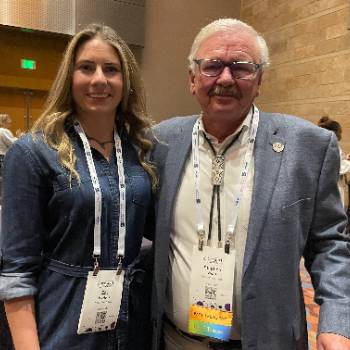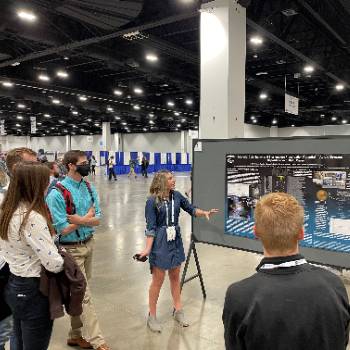Awards Recognize New Mexico Tech Grad Student’s Research
Jan. 3, 2023

SOCORRO, N.M. – New Mexico Tech graduate student Zoë Havlena recently was recognized by two national organizations for her research work on gypsum deposits she collected from caves in Italy. Havlena, who is pursuing a doctorate in geomicrobiology, received the Astrobiology Program Early Career Collaboration Award from NASA and the William B. and Dorothy Heroy Research Grant from the Geological Society of America (GSA).
A presenter at the GSA Annual Conference in Denver, Havlena received recognition for the William B. and Dorothy Heroy Research Grant at the Penrose Circle and Student Awards Reception Oct. 10, 2022. The award’s grant funding allowed Havlena to travel to Italy this past July to perform geomicrobiology field work at the Frasassi and Acquasanta caves in Italy as part of her dissertation project. Geomicrobiology is the study of microbe-mineral interactions. Havlena’s award proposal is titled “Microbial activity and biosignature preservation in aging acidic gypsum deposits from sulfidic caves.”
The NASA Early Career Collaboration Award (ECCA), awarded in October 2022, will allow Havlena to travel to the space agency’s Goddard Space Flight Center in Greenbelt, Maryland, for a month starting in January 2023. Havlena will work with her collaborator, Dr. Heather Graham, and use resources in the Astrobiology Analytical Laboratory and Planetary Environments Laboratory to continue their ongoing research on evaluating the presence of organic biomarkers in the gypsum samples she collected at the Frasassi Caves in Italy.

Detecting biomarkers preserved in these cave samples, which are thought to be chemically similar to deposits on Mars, might indicate how suitable gypsum is as a target for the future search for evidence of life on Mars, Havlena said.
“These awards are very beneficial to my progress on my Ph.D.,” Havlena said. “Being able to secure my own funding for field work and research is an important step in my professional development and allows me more flexibility with the scope of my research.”
Havlena, who earned her bachelor’s and master’s degrees in biology from New Mexico Tech, said that being able to travel and collaborate with researchers at institutions such as NASA is valuable for expanding her technical skills and research network.
“With these awards, I was able to travel to collect these unique samples and will now be using specialized instrumentation to analyze them – things I may not otherwise have been able to do without this funding,” she said.